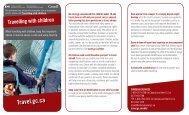Bon Voyage, But... - Travel
Bon Voyage, But... - Travel
Bon Voyage, But... - Travel
You also want an ePaper? Increase the reach of your titles
YUMPU automatically turns print PDFs into web optimized ePapers that Google loves.
SUPPLEMENTAL TRAVEL<br />
HEALTH INSURANCE<br />
Do not rely on your provincial<br />
or territorial health plan to<br />
cover costs if you get sick or<br />
are injured while abroad.<br />
Out-of-country health care can<br />
be costly, and your health plan<br />
may not cover any medical<br />
expenses abroad. It is your<br />
responsibility to seek information<br />
from your provincial or<br />
territorial health authority and<br />
to obtain supplementary travel<br />
insurance and understand the<br />
terms of your policy.<br />
Carry details of your insurance<br />
with you while travelling and<br />
leave a copy with a friend or<br />
relative at home.<br />
Your provincial or territorial<br />
health insurance plan will<br />
become invalid if you live<br />
elsewhere beyond a certain<br />
length of time. Personal<br />
medical insurance is available<br />
for individuals and their<br />
dependants living outside<br />
Canada for extended periods.<br />
Check with your insurer before<br />
you leave Canada.<br />
You may also want to<br />
purchase a travel insurance<br />
package that includes flight<br />
cancellation, trip interruption,<br />
and/or lost luggage<br />
coverage. Doing so can<br />
prevent major disruptions<br />
and additional costs.<br />
POST-TRAVEL MEDICAL<br />
MATTERS<br />
See your doctor if you<br />
become sick or feel unwell<br />
after returning to Canada.<br />
Inform the doctor, without<br />
being asked, that you<br />
have been travelling or<br />
living outside Canada and<br />
where you have been.<br />
Explain your travel<br />
history and any<br />
treatment you<br />
received.<br />
TRAVELLING BY CAR<br />
Keep in mind that each<br />
country has its own driving<br />
regulations. In some countries,<br />
a driver may be questioned<br />
and/or detained by police<br />
following even a minor<br />
accident. You may be required<br />
to obtain an International<br />
Driving Permit and/or additional<br />
insurance to drive a<br />
vehicle in another country. For<br />
further information, consult<br />
our Country <strong>Travel</strong> Reports or<br />
the Canadian Automobile<br />
Association (CAA).<br />
READY OR NOT!<br />
Find out if you’re up<br />
to the challenge of an<br />
emergency in a foreign<br />
country by taking a trip<br />
through our online action<br />
mazes at:<br />
travel.gc.ca/mazes<br />
MONEY MATTERS<br />
Canadian currency and<br />
traveller’s cheques are rarely<br />
accepted abroad. Before you<br />
leave Canada, consult a bank<br />
or foreign currency agent to<br />
find out the most appropriate<br />
currency to carry.<br />
It is always a good idea to have<br />
a small amount of local<br />
currency on hand when you<br />
arrive, unless importing local<br />
currency is a crime. There may<br />
be restrictions on the amount<br />
of money you can take into or<br />
out of a country. Check<br />
currency regulations with your<br />
travel agent or the country’s<br />
embassy or consulate in<br />
Canada.<br />
18 travel.gc.ca travel.gc.ca 19



